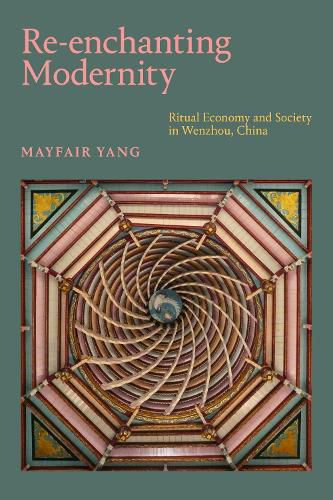Readings Newsletter
Become a Readings Member to make your shopping experience even easier.
Sign in or sign up for free!
You’re not far away from qualifying for FREE standard shipping within Australia
You’ve qualified for FREE standard shipping within Australia
The cart is loading…






In Re-enchanting Modernity Mayfair Yang examines the resurgence of religious and ritual life after decades of enforced secularization in the coastal area of Wenzhou, China. Drawing on twenty-five years of ethnographic fieldwork, Yang shows how the local practices of popular religion, Daoism, and Buddhism are based in community-oriented grassroots organizations that create spaces for relative local autonomy and self-governance. Central to Wenzhou’s religious civil society is what Yang calls a ritual economy, in which an ethos of generosity is expressed through donations to temples, clerics, ritual events, and charities in exchange for spiritual gain. With these investments in transcendent realms, Yang adopts Georges Bataille’s notion of ritual expenditures to challenge the idea that rural Wenzhou’s economic development can be described in terms of Max Weber’s notion of a Protestant Ethic . Instead, Yang suggests that Wenzhou’s ritual economy forges an alternate path to capitalist modernity.
$9.00 standard shipping within Australia
FREE standard shipping within Australia for orders over $100.00
Express & International shipping calculated at checkout
In Re-enchanting Modernity Mayfair Yang examines the resurgence of religious and ritual life after decades of enforced secularization in the coastal area of Wenzhou, China. Drawing on twenty-five years of ethnographic fieldwork, Yang shows how the local practices of popular religion, Daoism, and Buddhism are based in community-oriented grassroots organizations that create spaces for relative local autonomy and self-governance. Central to Wenzhou’s religious civil society is what Yang calls a ritual economy, in which an ethos of generosity is expressed through donations to temples, clerics, ritual events, and charities in exchange for spiritual gain. With these investments in transcendent realms, Yang adopts Georges Bataille’s notion of ritual expenditures to challenge the idea that rural Wenzhou’s economic development can be described in terms of Max Weber’s notion of a Protestant Ethic . Instead, Yang suggests that Wenzhou’s ritual economy forges an alternate path to capitalist modernity.